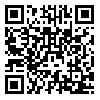Volume 3, Issue 4 (2-2010)
2010, 3(4): 37-44 |
Back to browse issues page
Download citation:
BibTeX | RIS | EndNote | Medlars | ProCite | Reference Manager | RefWorks
Send citation to:



BibTeX | RIS | EndNote | Medlars | ProCite | Reference Manager | RefWorks
Send citation to:
Ahadi B, Narimani M. The role of disgust, anxiety and depression in explaining obsessive-compulsive symptoms in a non-clinical sample. Research in psychological health 2010; 3 (4) :37-44
URL: http://rph.khu.ac.ir/article-1-121-en.html
URL: http://rph.khu.ac.ir/article-1-121-en.html
Abstract: (10580 Views)
The aim of this study was to explain obsessive-compulsive symptoms according to disgust, anxiety and depression in a non-clinical sample. one hundred students (50 girls, 50 boys) were included in this study. All participants were asked to complete Maudsley Obsessive-Compulsive Inventory (MOCI), Disgust Scale (DS), State-Trait Anxiety Inventory (STAI), and Beck Depression Inventory (BDI). Analysis of the data involved both descriptive and inferential statistics including means, standard deviations, Pearson' correlation coefficients and regression analyses. The results revealed that disgust, anxiety and depression were significantly positively correlated with total obsessive-compulsive scores in both males and females. The results of regression analysis showed checking and doubt symptoms were best predicted by state-trait anxiety, while washing were best predicted by disgust. These findings are in line with the hypothesis of a specific relationship between disgust and at least some kinds of obsessive symptoms.
Type of Study: Research |
Published: 2010/02/15
Published: 2010/02/15
| Rights and permissions | |
 | This work is licensed under a Creative Commons Attribution-NonCommercial 4.0 International License. |





